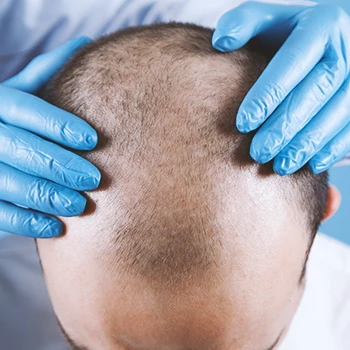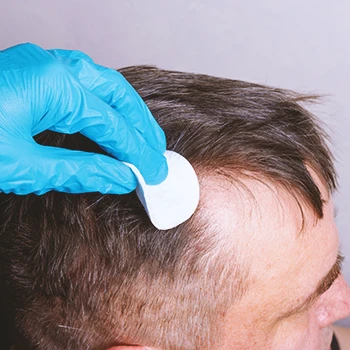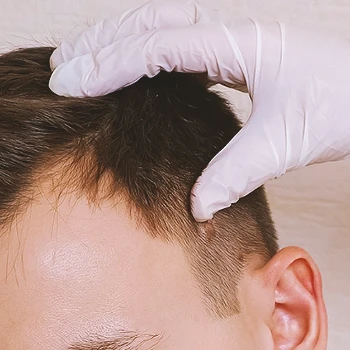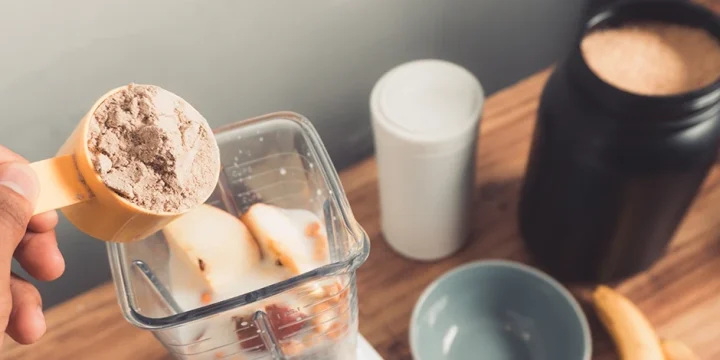In my medical observations, I've noted that men using steroids for muscle building often exhibit signs of male-pattern hair loss.
Drawing from my pathology expertise, this phenomenon correlates with hormonal imbalances caused by steroid use.
Reflecting on a case where a patient was prescribed anabolics for a medical condition and reported hair loss, I delved into research and consulted with endocrinologists to understand if hair loss is a universal outcome for steroid users.
Here's a more detailed explanation based on medical evidence and pathology.
Quick Summary
Do Steroids Make Your Hair Fall Out?

Steroids may induce hair loss by disrupting normal hormonal production, a phenomenon I've observed in clinical pathology. These changes can significantly impact hair growth cycles.
According to research published in the PRS Global Open journal, hormonal changes are the primary reason for hair loss on the scalp in men, known as male pattern baldness (MPB) [1].
Changes in hormonal levels are inevitable in aging men, and they are one of the main reasons why they show thinning hair.
However, in my experience, both in clinical settings and through medical literature, men taking steroids for medical or athletic purposes also often experience hair thinning.
High-quality legal steroids with natural ingredients that support testosterone levels can be a safer and more potent alternative. These have been shown to aid in reaching health goals without the adverse effects on hair health commonly associated with steroids.
Here's a more detailed explanation.
How They Can Affect Your Hair

Steroid types vary in how they impact hair growth.
Corticosteroids
Prednisone, a glucocorticoid-type steroid distinct from anabolic steroids used in bodybuilding, is primarily prescribed for reducing inflammation.
A notable side effect of prednisone is hair loss, which distinguishes it from its counterparts.
From a pathological standpoint, prednisone and related steroids not only reduce inflammation but also elevate cortisol levels, which I've seen disrupt the hair growth cycle, leading to hair loss.
Anabolic Steroids
Conversely, anabolic steroids influence hair health by raising androgenic hormone levels, especially testosterone (T) and dihydrotestosterone (DHT), which can also lead to hair loss.
Testosterone levels increase with steroid usage, which is the main reason men take them, as they can help increase muscle strength and size.
However, as T levels increase in the body, DHT levels may also increase due to the conversion of testosterone into DHT. Thus, hair loss may become a problem.
According to 2020 research published in the International Journal of Molecular Science, androgenic alopecia, a condition where men lose hair in a well-defined pattern, is one of the most notable effects of increased DHT in the body [2].
“Pattern hair loss is caused by a hormone called dihydrotestosterone (DHT). DHT causes a change in the hair follicles called ‘miniaturization’, where the follicle becomes progressively smaller and eventually stops producing hair.”
- Nely Aldrich, MD, FAAD
Excess of this sex hormone causes healthy hair follicles to shrink, resulting in easier and faster hair loss. Furthermore, it can interfere with new hair growth, making it more difficult for the hair to regrow, as stated in the WebMD [3].
What Types of Steroids Cause Hair Thinning?
A DHT-based type of anabolic steroid may be more likely to cause alopecia in users compared to other derivatives like testosterone.
The reason is that DHT has more androgenic properties than testosterone.
As a result, it can bind to the androgen receptors in a hair follicle, negatively affecting the hair growth cycle [4].
From a medical perspective, avoiding certain steroids known for exacerbating hair loss may help prevent further balding.
These are:
- Masteron (Drostanolone)
- Primobolan (Metenolone)
- Anavar (Oxandrolone)
- Anadrol (Oxymetholone)
- Winstrol (Stanozolol)
- Proviron (Mesterolone)
- Superdrol (Methasterone)
The National Institute on Drug Abuse (NIDA) states that most side effects of anabolic steroid misuse are reversible if the user stops taking the drugs.
However, some effects, including male-pattern baldness, are irreversible [5].
The good news is that there are natural and legal steroids that you can take as an alternative to anabolic steroids.
Compared to illegal anabolics, these natural alternatives won't interfere with your body's biological processes or worsen your genetic predisposition to losing hair.
How Do You Stop Hair Fall From Anabolics?

You can stop hair fall by discontinuing your steroid regimen.
Also, taking them as prescribed by your doctor may reduce the adverse effects of anabolic steroids on your appearance.
If you have suffered hair loss, you have treatment options like hormone therapy or hair transplants.
By doing this, you may be able to achieve hormonal balance and regrow your hair.
Other hair loss treatments may include improving blood flow to the hair follicles, which helps stimulate hair growth.
Knowing that steroids can harm your hair, it makes sense to boost your testosterone levels naturally with supplements containing safe and effective ingredients. That means you can build muscle mass faster without suffering adverse side effects.
Related Article: Can Testosterone Boosters Cause Hair Loss
FAQs
Can Steroids Lead To Permanent Hair Loss?
Steroids can lead to permanent hair loss in rare cases. Careless use of anabolic steroids can aggravate a genetic predisposition to alopecia and result in a permanent condition. Most users experience temporary hair loss, and more hair grows once they stop taking steroids [5].
Which Steroids Will Not Cause Hair Loss?
All steroids may cause hair loss because they disrupt the way the body produces hormones. This is why they may cause skin thinning, mood swings, and weight gain. If you're not genetically prone to hair loss, you may reduce their side effects on hair by using them at a low dose.
Can You Have Hair Growth After Steroids?
You can grow hair after steroids and choose between non-surgical and surgical treatments.
Hair regrowth can take several weeks to months after effective treatment. This, of course, is dependent on your ability as a patient to respond to the hair loss treatment being considered by your doctor to address the condition.
References:
- https://www.ncbi.nlm.nih.gov/pmc/articles/PMC4174066/
- https://www.ncbi.nlm.nih.gov/pmc/articles/PMC7432488/
- https://www.webmd.com/skin-problems-and-treatments/hair-loss/understanding-hair-loss-basics
- https://www.ncbi.nlm.nih.gov/books/NBK557634/
- https://nida.nih.gov/research-topics/anabolic-steroids
About The Author
You May Also Like






